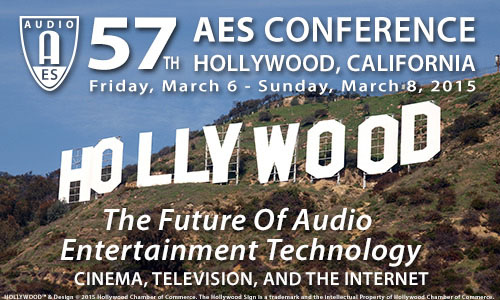Entertainment Industry Leaders Prepare for Audio Engineering Society 57th International Conference on The Future of Audio Entertainment Technology

—The 57th Conference brings leaders in the audio-for-picture field together to explore the industry’s strengths and weaknesses, and to chart a common path into the future —
New York, NY, February 17, 2015 — The Audio Engineering Society will gather top audio entertainment technology professionals for its 57th International Conference on Friday, March 6–8, 2015, in Hollywood, California, at the renowned TCL Chinese 6 Theatres. This first-ever Future of Audio Entertainment Technology Conference brings together the best in researchers, acousticians and engineers to address the current and future audio needs of the cinema, television and online entertainment industries.
As the next wave of immersive audio technologies arrive, it is incumbent on the industry to rally around an organized and focused set of standards. The three-day AES conference, led by co-chairs Brian McCarty and Dr. Sean Olive, will focus on critical issues in sound for picture, such as the need for high intelligibility for dialog, which encompasses related issues such as cinema acoustics and home-theater design. Dr. Peter Mapp, one of the world’s leading experts on dialog intelligibility, will explain the scientific issues surrounding these topics and then lead a workshop that includes multi-OSCAR®-winning sound mixer Lon Bender in an analysis of the challenges faced by the creators of sound for picture.
Additionally, topics of loudness and noise-induced hearing impairment will be examined in detail, including input from medical experts. The next topic is streaming, the new frontier for AV distribution – one where audio is already approaching a more equal footing with picture – but one with its own challenges for sound (for instance, there’s a wide range of codecs than can be used, often with inconsistent results). Loudness in streaming has become better controlled in recent years with the implementation of the CALM Act and a growing pool of technologies and products that allow for more precise measurement and management of loudness. Frequency response in the streaming domain, though, remains less comprehensively addressed. A workshop, chaired by Roger Charlesworth of the DTV Audio Group, will tackle this issue with engineering talent from Starz Entertainment, Meridian Audio and the Telos Alliance. This day’s panels will also focus on headphones, a consumer electronics category that has seen explosive growth in the last few years. Delivery of immersive sound and binaural techniques with headphones will be demonstrated with conference partner Sennheiser Electronic.
The 57th Conference is further set to take an intensive look at immersive sound formats. Leading spatial-audio specialist Dr. Francis Rumsey will lead the day, defining the various issues and the scope of workshops to be given. These will include a session on Delivery Standards and Methods, co-sponsored by the SMPTE; Integrating Object–Based and Conventional Audio for Delivery to the Home, and the Rendering of Immersive Audio in the Home, from stakeholders including Dolby Labs, DTS-MDA, Auro-3D, Iosono, Fraunhofer, MPEG-H, and NHK 22.2. At the end of the third Conference day, the delegates will be asked to develop a list of action items that will need to be addressed by the AES, and perhaps other standards bodies.
The AES’s 57th International Conference intends to lay the foundation for a new generation of interoperability standards for sound for picture. These will pay off in the form of better integration and lowered distribution costs with new generations of video formats, and ultimately in a more immersive, consistent, and enjoyable experience for consumers in the cinema and in the home.
For information on the AES 57th Conference on The Future of Audio Entertainment Technology, as well as further Registration, Travel and Technical Program information, visit http://www.aes.org/conferences/57/. An AES member discount is available.
Get the TV Tech Newsletter
The professional video industry's #1 source for news, trends and product and tech information. Sign up below.
